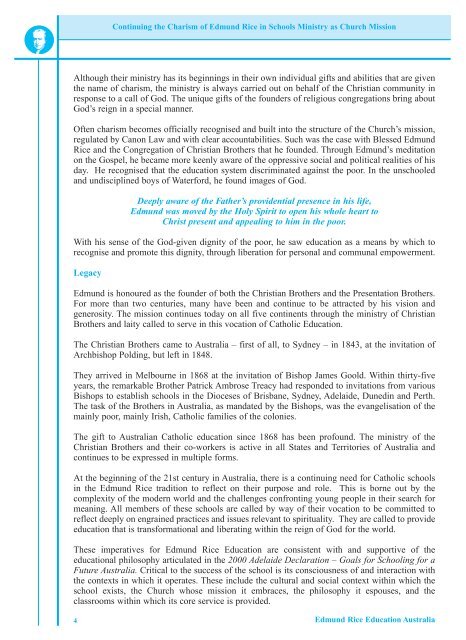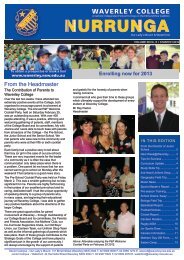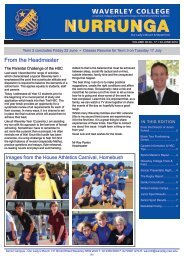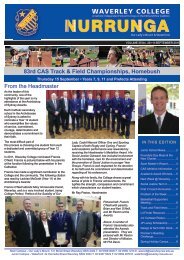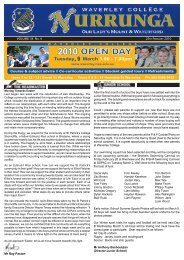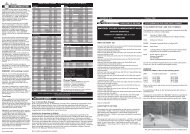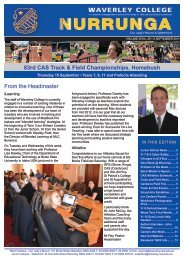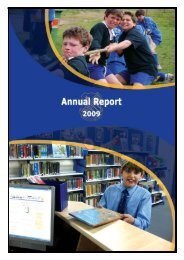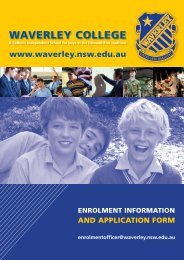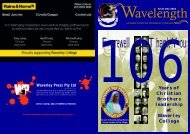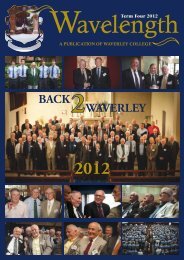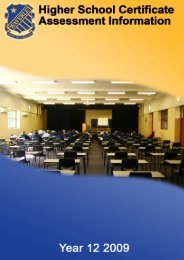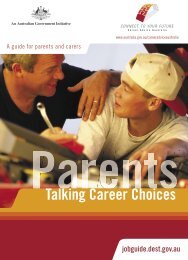Edmund Rice Education - The Charter - Waverley College
Edmund Rice Education - The Charter - Waverley College
Edmund Rice Education - The Charter - Waverley College
You also want an ePaper? Increase the reach of your titles
YUMPU automatically turns print PDFs into web optimized ePapers that Google loves.
Continuing the Charism of <strong>Edmund</strong> <strong>Rice</strong> in Schools Ministry as Church MissionAlthough their ministry has its beginnings in their own individual gifts and abilities that are giventhe name of charism, the ministry is always carried out on behalf of the Christian community inresponse to a call of God. <strong>The</strong> unique gifts of the founders of religious congregations bring aboutGod’s reign in a special manner.Often charism becomes officially recognised and built into the structure of the Church’s mission,regulated by Canon Law and with clear accountabilities. Such was the case with Blessed <strong>Edmund</strong><strong>Rice</strong> and the Congregation of Christian Brothers that he founded. Through <strong>Edmund</strong>’s meditationon the Gospel, he became more keenly aware of the oppressive social and political realities of hisday. He recognised that the education system discriminated against the poor. In the unschooledand undisciplined boys of Waterford, he found images of God.Deeply aware of the Father’s providential presence in his life,<strong>Edmund</strong> was moved by the Holy Spirit to open his whole heart toChrist present and appealing to him in the poor.With his sense of the God-given dignity of the poor, he saw education as a means by which torecognise and promote this dignity, through liberation for personal and communal empowerment.Legacy<strong>Edmund</strong> is honoured as the founder of both the Christian Brothers and the Presentation Brothers.For more than two centuries, many have been and continue to be attracted by his vision andgenerosity. <strong>The</strong> mission continues today on all five continents through the ministry of ChristianBrothers and laity called to serve in this vocation of Catholic <strong>Education</strong>.<strong>The</strong> Christian Brothers came to Australia – first of all, to Sydney – in 1843, at the invitation ofArchbishop Polding, but left in 1848.<strong>The</strong>y arrived in Melbourne in 1868 at the invitation of Bishop James Goold. Within thirty-fiveyears, the remarkable Brother Patrick Ambrose Treacy had responded to invitations from variousBishops to establish schools in the Dioceses of Brisbane, Sydney, Adelaide, Dunedin and Perth.<strong>The</strong> task of the Brothers in Australia, as mandated by the Bishops, was the evangelisation of themainly poor, mainly Irish, Catholic families of the colonies.<strong>The</strong> gift to Australian Catholic education since 1868 has been profound. <strong>The</strong> ministry of theChristian Brothers and their co-workers is active in all States and Territories of Australia andcontinues to be expressed in multiple forms.At the beginning of the 21st century in Australia, there is a continuing need for Catholic schoolsin the <strong>Edmund</strong> <strong>Rice</strong> tradition to reflect on their purpose and role. This is borne out by thecomplexity of the modern world and the challenges confronting young people in their search formeaning. All members of these schools are called by way of their vocation to be committed toreflect deeply on engrained practices and issues relevant to spirituality. <strong>The</strong>y are called to provideeducation that is transformational and liberating within the reign of God for the world.<strong>The</strong>se imperatives for <strong>Edmund</strong> <strong>Rice</strong> <strong>Education</strong> are consistent with and supportive of theeducational philosophy articulated in the 2000 Adelaide Declaration – Goals for Schooling for aFuture Australia. Critical to the success of the school is its consciousness of and interaction withthe contexts in which it operates. <strong>The</strong>se include the cultural and social context within which theschool exists, the Church whose mission it embraces, the philosophy it espouses, and theclassrooms within which its core service is provided.4<strong>Edmund</strong> <strong>Rice</strong> <strong>Education</strong> Australia


